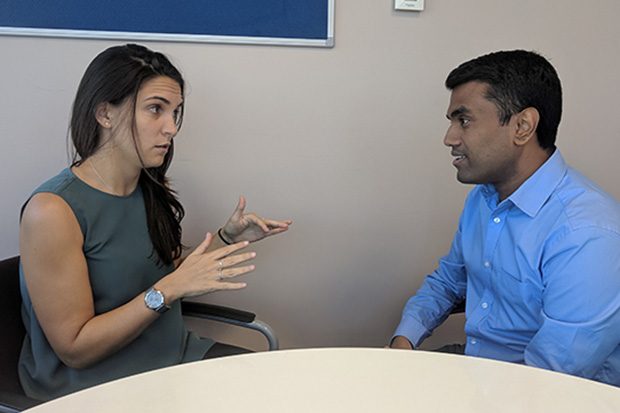
A difficult situation
Picture the scene:
Your manager, Raj, works more than his contracted hours every day by starting early in the morning, but he always leaves the office at 5:00pm to go swimming. Raj’s manager, Tammy, is not happy because she works many more hours of overtime than Raj.
Eventually, Tammy gets so angry that she refuses to talk to Raj for two weeks. Tammy’s bad mood and the breakdown in communication affects the whole team and makes your work difficult.
How would you deal with this situation? What is the most challenging situation you’ve been in with colleagues?
My name is Jonny Fertray and I work in the Public Health England (PHE) health screening service. This scenario was one I experienced in a previous job. Raj began working in a different team very soon after this, so I never got a chance to help resolve the problem!
I attended a Constructive Conversations workshop held by PHE, where I worked through this situation. I came away feeling confident I could now handle it more easily.
PHE offers these workshops to its staff for free, but I want to share some of the principles to those of you who cannot attend one.
What are constructive conversations?
Approaching conversations with these tools will help you to deal with tough situations. You will be better able to focus constructive feedback on a specific issue, behaviour, or problem and develop agreement throughout.
The aim is to:
- build confidence in managing tough situations
- increase the chances of influence without overpowering
- create healthy work relationships
- encourage effective teamwork
- help to develop rapport quickly
- help to manage conflict
- encourage different ideas and understand different viewpoints
Methods of feedback
The workshop describes 5 main formats for providing feedback.
There are formal methods - such as an end of year review. These can aim to:
- focus on strengths
- focus on weaknesses
There are informal methods - such as a short discussion. These can aim to:
- focus on strengths
- be as accurate and fair as possible
- focus on weaknesses
Research shows that these methods vary widely in their effectiveness from informal, accurate and fair feedback (+39%) to formal feedback focusing on weaknesses (-27%). This shows how important it is to frame and present conversations constructively.
We tend to avoid having these conversations for many reasons, including fear of the reaction of others, feeling exposed or unsupported, concern about status or position and having a lack of time to plan and prepare.
Tools at your disposal
The workshop describes 4 techniques that you can use in the workplace. These are:
- active listening – showing that you are listening, and responding appropriately
- open questions – asking questions in a way that does not restrict or guide the respondent
- co-consulting – working through a difficult conversation with another person first
- using feedback models, focusing on outcomes
You may already use some of these techniques, but learning more about each one can help you to build a process to follow every time and get the best outcomes.
I spoke to my colleague Kaspar Pedersen, regional quality assurance (QA) advisor in the South West. He said the training would help in preparing PHE Screening’s consultants for the QA process, where PHE conducts interviews with screening services.
“This workshop relates to our work in the principle of leaving ‘no surprises’ and it is relevant before, during and after the interview process. It’s about having respect for how providers and commissioners will feel about our expectations and our perspective on issues.
“It’s important to address potential issues promptly and to be honest. There are different ways to say the same thing, but there’s no sense in using unclear language to manage expectations if it causes uncertainty and confusion.”
PHE staff can register to attend a session.
Everyone can read more about active listening and giving feedback.
PHE Screening blogs provide up to date news from all NHS screening programmes. You can register to receive updates direct to your inbox, so there’s no need to keep checking for new blogs. If you have any questions about this blog article, or about population screening in England, please contact the PHE screening helpdesk.
2 comments
Comment by Adenike posted on
Hello Jonny, following your attendance at the Constructive Conversations workshop, how would you deal with the Tammy and Raj situation now? Thanks
Comment by Jonathan Fertray posted on
Dear Adenike,
Thank you for your comment.
In the workshop, I co-consulted with others to run through the situation and plan what I might say. I considered why Tammy was feeling the way she was.
It was important to engage in active listening, as I may have thought I already understood the situation but I had not heard Tammy’s side of the story.
In this situation, I did not have the power to make Raj and Tammy work fewer hours, but I did have the power to help diffuse the situation and to then make sure concerns about staffing issues and work-life balance were escalated.
Regards,